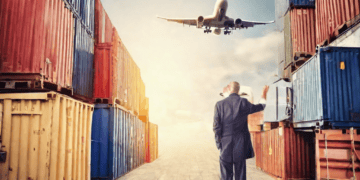In the face of geopolitical uncertainties and climate risks, the demand for supply-chain data continues to remain strong, according to insights gathered from a recent survey by Freightos. Despite a slowdown in global trade, the survey, which included input from over 200 logistics professionals, indicates a persistent interest in enhanced visibility among boards of directors navigating an uncertain post-pandemic world.
The survey revealed a noteworthy increase in mentions of supply chains in US SEC-filed annual reports, underscoring the growing importance of supply-chain visibility. Three-fifths of respondents expressed their anticipation of increased engagement in freight data intelligence. Interestingly, the level of interest in the Freightos Baltic Index remained significantly elevated, indicating sustained interest even as container shipping rates returned to normal late last year.
Freightos CEO Zvi Schreiber highlighted the lasting impact of the Covid-related supply-chain challenges, emphasizing that the global freight industry has become a regular topic in boardrooms. He noted that while market volatility is transient, access to relevant data is a permanent fixture.
Contrary to expectations, companies like o9 Solutions, specializing in software to identify supply disruptions and forecast demand, observed an increased demand for supply chain technology. Stephan de Barse, Chief Revenue Officer of o9 Solutions, emphasized that geopolitical tensions and the aftermath of events like Covid and Russia-Ukraine have kept supply-chain transformation a crucial topic at the board level.
Large companies, including UK-based Haleon, are investing significantly in digitization and artificial intelligence to overhaul their supply chains. Bart Derde, Chief Supply Chain Officer at Haleon, highlighted the necessity of digital transformation in ensuring agility and scenario planning, particularly in a world grappling with Covid and geopolitical tensions.
India serves as a notable example of successful tech-enabled visibility in streamlining trade disruptions. The World Bank’s logistics report commended India’s investment in technology and physical infrastructure over the past eight years, leading to a significant improvement in cargo flow. The implementation of tracking devices on shipping containers contributed to a substantial reduction in dwell times at an eastern port.
The report emphasizes the need for policies that promote better clearance processes, infrastructure investments, the adoption of digital technology, and the reduction of carbon emissions to enhance logistics performance.
In conclusion, the sustained demand for supply-chain data amid global challenges underscores the recognition of its critical role in navigating uncertainties and ensuring the resilience of global supply chains.
Explore top supply chain logistics news at The Supply Chain Report. Interested in international trade? Visit ADAMftd.com for free tools.
#Freightos #SupplyChainData #GeopoliticalRisks #ClimateRisks #LogisticsInsights #VisibilityMatters #FreightosBalticIndex #SupplyChainTechnology #o9Solutions #AIinSupplyChain #Haleon #DigitalTransformation #SupplyChainResilience #TechEnabledVisibility #GlobalTrade #TradeDisruptions #IndiaLogistics #WorldBankReport #SupplyChainVisibility #CargoFlowImprovement #SupplyChainTransformation #InfrastructureInvestment #DigitalTechnology #CarbonReduction #PostPandemicChallenges #SecReports #BoardroomDiscussions















